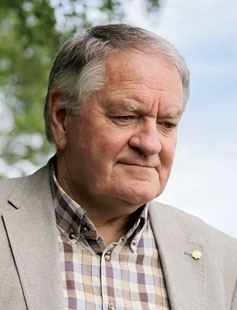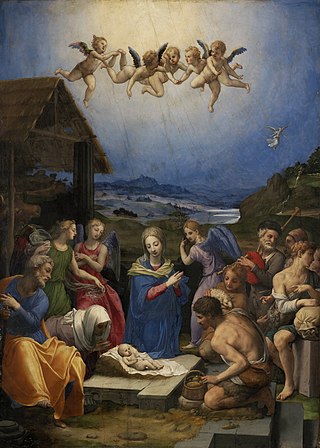
John Ceiriog Hughes was a Welsh poet and collector of Welsh folk tunes, sometimes termed a Robert Burns of Wales. He was born at Penybryn Farm, overlooking the village of Llanarmon Dyffryn Ceiriog in the Ceiriog Valley of north-east Wales, then in Denbighshire, now part of Wrexham County Borough. One of eight children, he was a favourite of his mother, Phoebe, a midwife and herbal-medicine expert.

The Music of Wales, particularly singing, is a significant part of Welsh national identity, and the country is traditionally referred to as "the land of song".

Dafydd Iwan Jones is a Welsh singer and nationalist politician who rose to fame writing and performing folk music in the Welsh language. From 2003 to 2010, Iwan was the president of Plaid Cymru, a political party which advocates for Welsh independence from the UK.
"Men of Harlech" or "The March of the Men of Harlech" is a song and military march which is traditionally said to describe events during the seven-year siege of Harlech Castle between 1461 and 1468, when the castle was held by the Lancastrians against the Yorkists as part of the Wars of the Roses. Commanded by Constable Dafydd ap Ieuan, son of the Baron of Hendwr, the garrison withstood the longest known siege in the history of the British Isles. The song has also been associated with the earlier, briefer siege of Harlech Castle about 1408, which pitted the forces of Owain Glyndŵr against the future Henry V of England.
"The Skye Boat Song" is a late 19th-century Scottish song adaptation of a Gaelic song composed c.1782 by William Ross, entitled Cuachag nan Craobh. In the original song, the composer laments to a cuckoo that his unrequited love, Lady Marion Ross, is rejecting him. The 19th century English lyrics instead evoked the journey of Prince Charles Edward Stuart from Benbecula to the Isle of Skye as he evaded capture by government soldiers after his defeat at the Battle of Culloden in 1746.

"Hark! The Herald Angels Sing" is an English Christmas carol that first appeared in 1739 in the collection Hymns and Sacred Poems. The carol, based on Luke 2:14, tells of an angelic chorus singing praises to God. As it is known in the modern era, it features lyrical contributions from Charles Wesley and George Whitefield, two of the founding ministers of Methodism, with music adapted from "Vaterland, in deinen Gauen" of Felix Mendelssohn's cantata Festgesang.
"Suo Gân" is a traditional Welsh lullaby written by Morfydd Llwyn Owen.
Cwm Rhondda is a popular hymn tune written by John Hughes (1873–1932) in 1907. The name is taken from the Welsh name for the Rhondda Valley.
"Deck the Halls” is a traditional Christmas carol. The melody is Welsh, dating back to the sixteenth century, and belongs to a winter carol, "Nos Galan", while the English lyrics, written by the Scottish musician Thomas Oliphant, date to 1862.
"Calon Lân" is a Welsh hymn, the words of which were written in the 1890s by Daniel James (Gwyrosydd) and sung to a tune by John Hughes. The song was originally written as a hymn, but has become firmly established as a rugby anthem, associated with the Welsh rugby union, being sung before almost every Test match involving the Welsh national team – though more likely to be heard sung at matches involving the Welsh football team in recent years. In 2007 the song was one of the traditional Welsh songs to make it to the screen in an S4C television series Codi Canu, an attempt to bring traditional four-part harmony choral singing back to the Welsh rugby terraces.
Myfanwy, is a popular Welsh song composed by Joseph Parry in four parts for male voices, and first published in 1875.

"O come, O come, Emmanuel" is a Christian hymn for Advent, which is also often published in books of Christmas carols. The text was originally written in Latin. It is a metrical paraphrase of the O Antiphons, a series of plainchant antiphons attached to the Magnificat at Vespers over the final days before Christmas. The hymn has its origins over 1,200 years ago in monastic life in the 8th or 9th century. Seven days before Christmas Eve monasteries would sing the “O antiphons” in anticipation of Christmas Eve when the eighth antiphon, “O Virgo virginum” would be sung before and after Mary's canticle, the Magnificat. The Latin metrical form of the hymn was composed as early as the 12th century.
The Ash Grove is a traditional Welsh folk song whose melody has been set to numerous sets of lyrics. The best-known English lyrics were written by Thomas Oliphant in the 19th century.
Dives and Lazarus is traditional English folk song listed as Child ballad 56 and number 477 in the Roud Folk Song Index. It is considered a Christmas carol and based on the parable of the rich man and Lazarus. The song traditionally used a variety of tunes, but one particular tune, published by Lucy Broadwood in 1893 and used in other traditional songs, inspired many notable works and appeared in several pieces composed by Ralph Vaughan Williams.

"Delilah" is a song recorded by Welsh singer Tom Jones in December 1967. The lyrics were written by Barry Mason, and the music by Les Reed, who also contributed the title and theme of the song. It earned Reed and Mason the 1968 Ivor Novello award for Best Song Musically and Lyrically.

"Yma o Hyd" is a Welsh language folk song by Dafydd Iwan. The song was released during Iwan and Ar Log's "Taith Macsen" tour in 1983. Since then it has continued to gain popularity at cultural and sporting events.
"Once Upon a December" is a song from the 1997 20th Century Fox animated film Anastasia. The song was nominated for a Golden Globe Award for Best Original Song.
The King of Love My Shepherd Is is an 1868 hymn with lyrics written by Henry Williams Baker, based on the Welsh version of Psalm 23 and the work of Edmund Prys.

We'll Keep a Welcome is a 2000 album by singer Bryn Terfel of traditional hymns and folk songs associated with Wales. Terfel was accompanied on the album by the Orchestra of the Welsh National Opera, the Risca Male Choir and The Black Mountain Chorus. The majority of the songs are sung in the Welsh language.

Welsh folk music refers to music that is traditionally sung or played in Wales, by Welsh people or originating from Wales.











